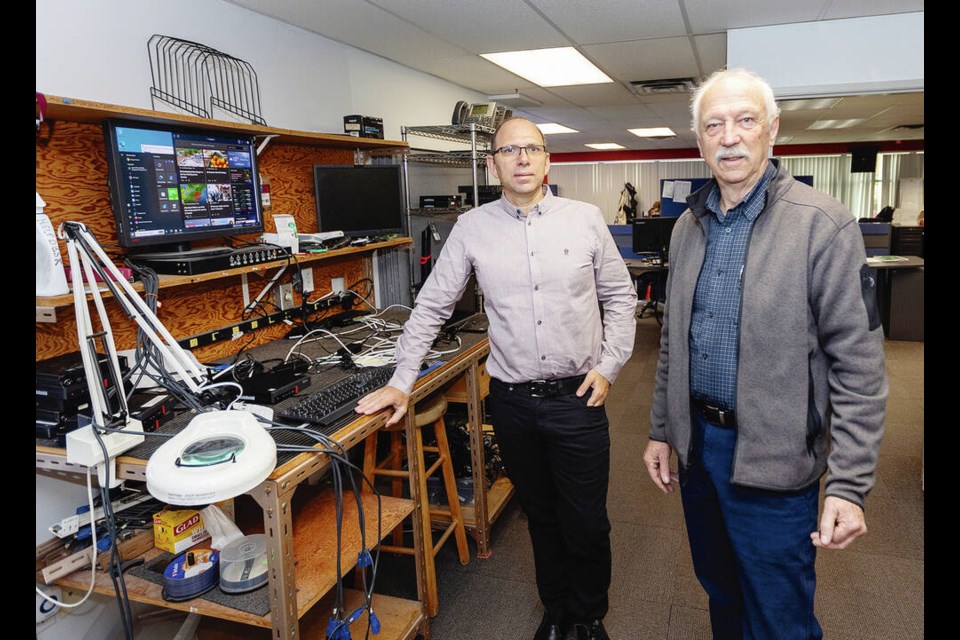Back in 1974, when personal and workplace computers were emerging and still science fiction for most British Columbians, Ed Life incorporated a company to service and support them.
The Victoria entrepreneur was cutting edge when he founded Tecnet, realizing that the computer would be part of everyday lives at home, in business and in government.
“I guess I was a visionary in that respect,” Life said with a laugh in a recent interview.
Fifty years later, Tecnet remains the longest operating computer services company in Canada, providing computer and network support to dozens of clients in B.C. and across Canada, including the thousands of computers used by the provincial government and its employees, as well as private corporations.
The company does hardware maintenance, IT service desk support, network and cloud hosting, infrastructure auditing, and security and project management, and has two major support centres in Victoria and Vancouver, and 35 service centres in B.C. for urban and rural communities.
But at 75, Life is signing off from the company he built and nurtured for so long. This year, Life struck a deal with Matt Van Heyst, an employee for 25 years, to acquire the Tecnet operation, which has more than 70 employees.
“I just felt it was time,” said Life. “You realize there’s nobody in the country who’s been in the business as long as I have, and there’s no company in the country that’s been operating as long as we have in this industry.”
To show just how long he’s been at it, Life hoisted a 30-pound steel hard drive that he started with in one hand and a mini plastic disc that’s, well, already obsolete.
“The new ones are the size of postage stamps,” Life said.
Van Heyst said Life has built a sound company with a solid customer base, and their services are in more demand than ever from equipment manufacturers and users who rely on the Tecnet to work on security patches and other emerging technologies and updates of their computers.
Life grew up near the Gorge in Saanich, where his father, Neville Life, was a civil engineer who helped build the current Gorge Walkway.
The budding entrepreneur delivered newspapers and sold Fuller brushes door to door. He studied to be an electrician and worked in the forestry industry for a spell, and then B.C. Tel — which later merged with Telus — but computer technology was calling.
Life got in on the ground floor of the emerging industry, studying computers at Lockheed in Los Angeles in the mid-1960s. It eventually folded and he returned to Victoria.
“At that time, there was one computer in Â鶹´«Ã½Ó³»and one in Victoria. I had all the test and service equipment that could support these two computers that really weren’t doing much … they didn’t have programmers, so effectively they didn’t work.”
By the early 1970s, he said, the province, University of Victoria and CFB Comox all had large computers.
Life saw an opportunity when smoke alarms started becoming popular in homes. He developed a digital dialler, so when a smoke alarm went off, it would phone the fire department.
“It kept us busy for a while, and it got me involved in the fire alarm industry and the computer industry, but there’s no computers … they were still coming.”
Eventually, IBM and the PC came along in 1981. Wang followed with word processing and Digital supplied hardware for the education and and scientific sectors.
“I got involved with people who made printers and peripheral devices and sold them to other companies,” said Life. “I got in the door that way.
When the IBM PC was rolled out in 1981, he said, the government bought a “ton” of them. “They had a 90-day warranty, return to manufacturer and I’m the only guy.”
Life said he could buy hard drives and equipment at good prices and make a profit.
“Business was good,” he said. “Back in the day, you couldn’t buy this equipment just anywhere. You had to know where to buy hard drives, and how to make things work. If you had one of these peripheral devices, you couldn’t get the service. I’d be the guy soldering, putting chips in and generally getting things to work.”
The business model continues today.
“We follow the manufacturers. We support it, fix it and keep it running … make sure it all works together,” said Life.
Life says retirement will keep him busy. At one time, he had his hand in 11 companies, including the HarbourLynx ferry in Nanaimo, which only lasted 18 months because of too few vessels and a blown engine.
He said he still runs a mortgage business and dabbles in real estate development. He also manages a time-share property in Whistler and skis regularly.
He also plays tennis, works on his boat and tinkers with his car collection — even racing a Corvette occasionally on a track in Washington.
“I always thought the more you put into life, the more you get out,” said Life, who has been married to wife Diana for 35 years and has two grown sons. “Stay busy, but manage the stress.”
Life said he hands off Tecnet to the new owner with “mixed emotions.”
“Couldn’t have been a better transition,” he said. “Matt knows all about the business. “



